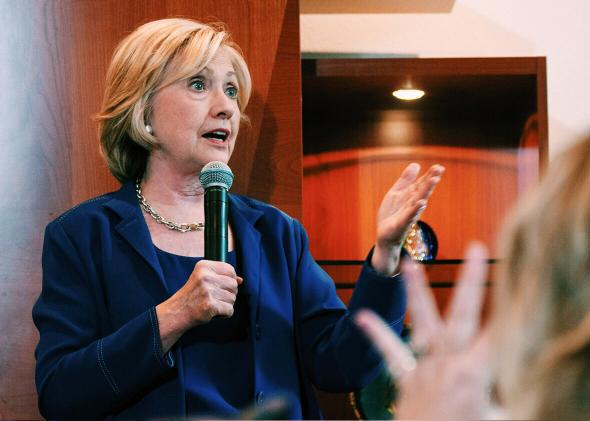On Tuesday, Hillary Clinton talked to CNN’s Brianna Keilar for her first national interview as a 2016 presidential candidate. The Democratic front-runner addressed some of the questions surrounding her use of a private server to house her State Department emails while she was secretary of state. The conversation wasn’t about the content of those emails as much as whether Clinton’s special ad hoc system for storing her emails—and her previous explanations about what messages she shared and what messages she deleted—were at the root of voters’ distrust of her.
Clinton’s answers won’t put questions about her trustworthiness to rest. She said the issue of the emails “is being blown up with no basis in law or fact.” Whether it is being blown up depends on whether you think her original decision to set up her own private server is a serious breach or not. But leaving that question aside, there’s no doubt that there is a sound basis for the questions being asked of Clinton.
Take a look at the fine print. According to the 2009 National Archives and Records Administration regulations in effect when Clinton was in office, “Agencies that allow employees to send and receive official electronic mail messages using a system not operated by the agency must ensure that Federal records sent or received on such systems are preserved in the appropriate agency record-keeping system.”
That regulation does allow for storage on private servers. Clinton says she made a practice of emailing officials on their official email accounts, so her work emails were immediately captured by the government’s servers. Maybe, but this was her own system and it didn’t meet the standard of “appropriate agency record-keeping system,” which is why when the State Department tried to complete document requests, they missed the emails held on Clinton’s private server. While other officials have used private email accounts in the past, no one used them exclusively as Clinton did.
The substantive reason this matters is that congressional investigators want to know if they really have access to all of the former secretary of state’s emails. As a matter of trust, voters have to determine whether Clinton’s claim to CNN that there’s nothing to see here matches her bespoke practice, which was outside the boundaries of rules and custom.
Since Clinton acted as the judge of what should be turned over and what shouldn’t, it’s legitimate to ask whether the standard she used for deleting or passing on emails meets the spirit of the rules. The spirit of the rules was to keep all correspondence related to the job. That’s why the presumption is that employee records are automatically retained and personal email accounts in which official business is conducted happens less frequently. Clinton’s arrangement was the opposite.
At her press conference addressing her online habits in March, Clinton said that in deciding which emails to turn over she wanted to “err on the side of providing anything that could be possibly viewed as work related.” She wasn’t just being careful, she said, she was being extra careful. “Out of an abundance of caution and care, you know, we wanted to send that message unequivocally.” She reiterated that claim this week: “I turned over everything that I could imagine.” But we know that some of her emails were not turned over to the State Department. Those were work related it would seem. Either that, or her definition of “work related” has some expanse in it. However, there’s also evidence that Clinton’s definition of “work related” was too constricted. More than 1,200 emails were returned by the State Department for being too personal. This is just the kind of confusion that the government’s retention system requirements were set up to minimize.
Clinton also said in her CNN interview that she “didn’t have to turn over anything” and “[she] chose to turn over 55,000 pages because [she] wanted to go above and beyond what was expected of [her].” Later, she repeated that she had “no obligation” to turn over her emails to the State Department.
That isn’t true. It leaves the impression that since handing over the emails was completely voluntary, the candidate can’t fall short of any standard. But as Secretary Clinton said in her first press conference about this issue in March, she did have an obligation to turn over the emails. “That was my obligation,” she said of turning over the emails. “I fully fulfilled it.” It was not only State Department practice that employees were to keep their emails in the system, the State Department also made a special request of all former secretaries of state after Clinton left. She could not deny that request.
The public may not care about Clinton’s email server. Or if they do care, they may vote for her based on whether they trust her to care about their problems, not based on her emailing habits. Or, they may find the whole business confusing and move on, which is the best possible outcome of all for Clinton.
